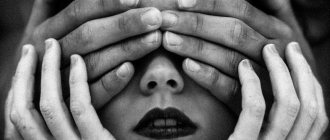What is addictive behavior?
Addictive behavior is one of the types of deviant behavior, which is expressed by the desire to get rid of psychological discomfort with the help of certain substances (alcohol, drugs) or repeated actions (gambling addiction, workaholism, overeating). Addictus is a legal term used to describe a debtor condemned to servile obedience to a creditor. That is, metaphorically, addictive behavior is a deep dependence on an external coercive force that demands complete obedience and receives it. Accordingly, an addict is a dependent person who is unable to control his addiction to certain actions .
Addictive behavior in psychology refers to a whole group of disorders united under the term “addiction diseases.” Typically, this course of action has a destructive effect on the health and activity of the addict himself, his immediate and wider social environment.
Addictive behavior is characterized by the fact that a person spends a significant part of his time satisfying a painful addiction. He stops developing as a person, cannot choose and control what he does, accepts or uses. But the main thing is that he is not able to cope with his habits on his own. Gradually, an environment of the same dependent individuals is formed, and all this does not allow a person to break out of the vicious circle of addictions.
Types of addictive behavior:
- Chemical addiction is an uncontrollable craving for psychoactive substances (PAS). A surfactant is anything that a person uses in one way or another (drinks, smokes, snorts, injects). At risk are individuals with painful heredity, shy or eccentric, mentally immature people.
- Food addiction (eating disorder) is a behavioral syndrome associated with excessive concentration on food and one’s weight (anorexia nervosa, bulimia nervosa, overeating). At risk are individuals with an unstable psycho-emotional state.
- Non-chemical (behavioural) addiction is any form of attraction or behavioral act that becomes the object of addiction (sexual behavior disorder, gadget mania, adrenaline mania, shopaholism). The risk group traditionally includes people with low self-esteem, a tendency to depression, and increased anxiety.
The above classification of types of addictions is considered quite arbitrary - usually one addiction leads to others. For example, there are so-called multi-dependent individuals. They simply cannot exist without some kind of addiction: they quit smoking and immediately become gambling addicts, give up alcohol and eat away the stress with chocolate bars.
Take a depression test
Types of addictive behavior of a dependent person
There are several types of addictive behavior, pharmacological and non-pharmacological in nature.
- Pharmacological (chemical) forms of addiction include alcoholism, drug addiction, substance abuse, and tobacco smoking. In this case, the desire to change one’s condition according to the addictive type is achieved through various chemical agents: alcohol, drugs, medications, toxic substances.
- Non-chemical addictions are gambling, sexual and love addictions, workaholism, computer addiction, food addiction. A change in the state of an addictive personality can occur through involvement in various types of activity, for example, gambling, sex, overeating or fasting, working, or listening to rhythmic music for a long time.
All types of addiction pose a serious threat to the mental and physical health of a person and those around him . In the structure of addictive behavior, the following syndromes of addictive behavior are distinguished:
- syndrome of altered susceptibility of the body to the action of a certain stimulus (defensive reactions, resistance to it, form of consumption);
- mental dependence syndrome (obsessive craving, mental comfort during consumption);
- physical dependence syndrome (compulsive craving, loss of control over the dose, withdrawal syndrome, physical comfort in intoxication).
These three syndromes distinguish a sick addict from a healthy person. People prone to addiction cannot tolerate states of tension , they suffer from high sensitivity, emotional imbalance, do not know how to manage their emotions, and experience difficulties with self-regulation. People suffering from addiction diseases experience a feeling of worthlessness, shame, guilt, have increased self-criticism, suffer from strong emotions, and are unable to transform feelings.
Manias of the digital age.
Alcohol traditionally ranks first on the list of the most dangerous types of addictive behavior for humans. But over the past decade, new types of addictions have emerged related to technical and digital innovations. Practicing psychologists tell us what addictions they are encountering more and more often.
Gadget addiction.
The first definition of Internet addiction was described in 1994 and sounded quite simple: “A strong desire to access the Internet while offline and an unwillingness to leave the Internet network while online.” Since then, the list of Internet services and addictions has expanded significantly.
Nomophobia (fear of being without a phone).
According to statistics, more than 50% of people are worried just by the thought that their phone will turn off and leave them without contact with loved ones. The absence of a phone causes severe discomfort, problems with concentration, and nervousness. Nomophobes prefer to communicate with virtual rather than real friends, scroll through pictures rather than admire wildlife. As a result, they overload the brain with an abundance of information, begin to get bored without it, and become more and more distant from reality.
Pornophilia.
This is a sexual disorder caused by excessive exposure to pornography. And it’s not surprising, because almost 15% of Internet offers are porn sites. Men and women aged 15-60 years are equally susceptible to pornophilia. Doctors talk about this painful addiction when the patient spends more and more time watching porn sites, changes genres from simple to complex, because the previous ones no longer excite. In severe cases, watching porn lasts 6-8 hours a day, completely replacing the patient’s real sex life.
Addiction to virtual reality (VR).
Virtual reality is becoming increasingly better and more believable. It is not surprising that gadget lovers prefer to go into the transcendental virtual world, where you can become a hero without much effort. Scientists suggest that virtual reality will become a big problem and a new form of Internet addiction.
Do you want to make better decisions, find your ideal career, realize your maximum potential and receive instructions for individual development?
?
Find out what kind of person you were destined to be at birth using the Human Design
. Only 2 days for wikigrowth.ru readers participation is free. Get it now
Psychological or emotional addictions.
In the entire range of addictions, psychological ones are considered mild because they do not cause visible harm to health. But people suffering from emotional addiction do experience extreme mental pain. And it already leads to serious physical illnesses or mental disorders.
Love addiction (pathological love).
This is a one-sided game when relationships are created under the motto “I can’t live without him (her)” or “I suffer, but I endure because I love.” The essence of addiction is that a dependent person cannot even mentally imagine his existence without a partner, who becomes an object of pleasure akin to a cigarette or a glass of wine. An addict gets pleasure from love, similar to drug intoxication. At the thought of breaking up, real withdrawal begins.
Orthorexia.
It’s one thing to give up foods for medical reasons, and another to fanatically count every calorie. A person with an addiction to a raw food diet or veganism (each chooses their own field of activity) really panics when they do not have the opportunity to eat right or exercise. He may stop communicating with those who eat incorrectly and refuse to participate in family celebrations. At best, he brings the right food with him and eats it under the surprised looks of others.
Psychotherapy addiction.
One of the effects of psychotherapy is compensation for psycho-emotional deficits or lack of skills. But there are people who have been going to a psychotherapist for years without obvious problems, using psychotherapy sessions as a magic pill. Once the pill helped, it means you can take it for the rest of your life and forget about the pain. Therefore, instead of learning to cope with life situations on their own, they habitually seek advice.
Take a mental test
How does addictive behavior develop?
Any addiction begins with a habit, which, when learned, changes the structure of the brain. It does not develop in one day and always follows the same pattern.
Experimentation.
A person occasionally performs a pleasant action or takes a psychoactive substance. The neurotransmitter dopamine, produced by the brain, increases mood and motivation and causes a feeling of euphoria. At the first stage, addiction has virtually no effect on studies, work, or relationships.
Search for emotional uplift.
When the effect of dopamine wears off, the person returns to normal life or decides to repeat the action. Frequent episodes of addiction result in the development of a habit, which leads to changes in behavior, food habits, and vocabulary.
Abuse.
Habitual action becomes the only response to any troubles. At the same time, the person categorically denies addiction and believes that he can stop his actions at any moment. But gradually addictive behavior becomes dominant, affects all areas of life, and ceases to provide the expected pleasure. At this stage, destructive behavior becomes the norm.
Addiction.
Due to destructive actions, the functioning of all organs is disrupted, biological changes in the structure of the brain occur, the body’s reserves are depleted, and serious diseases appear against the background of addiction. At this stage, behavior becomes asocial: the person loses interest in any activity, is capable of committing an offense, or showing violence.
How to recognize if you are addicted to something?
Most people are sure that addictive behavior is the lot of homeless people or losers in life. In fact, this can affect anyone. Here are 7 signs by which you can recognize an unhealthy relationship with your favorite things (actions/substances/products):
- Your behavior has changed . For the sake of pleasure, you are able to leave the house at night, go to the other end of the city, and cheat.
- You feel bad when the source of pleasure is absent . Without your usual actions or medications, you experience anxiety, worry, and cannot concentrate on household chores.
- You spend too much money on pleasure . You don’t buy necessary things, don’t pay your rent bills, borrow money from friends.
- You feel physiological discomfort . When you try to give up the usual pleasure, a headache, sleep disturbance, incomprehensible fatigue or classic withdrawal begins.
- You change your mind . For example, when you voluntarily give up sweets, you begin to come up with various excuses - why you need “sweets for the brain” or without the usual candy you will not be able to concentrate on work.
- You change your usual daily routine . The day begins and passes under the slogan of your favorite habit. If you are unable to perform your usual ritual, you will be nervous and feel that “something is wrong.”
- You are not interested in the opinions of others . You are not afraid of scandals, ultimatums, problems at work, or condemnation from your relatives. You only think about your habit and prove that you are right.
Now it’s clear how to define addictive behavior. Now we need to decide what to do about it.
What types of addiction are identified in medicine?
The main types of addiction are: alcohol addiction , which is based on the consumption of alcohol-containing drinks; drug addiction is associated with the use of substances that have a specific effect on the central nervous system; substance abuse develops with the use of medications and substances that are not drugs, but change the state of a person’s mental activity and behavior; drug addiction occurs when using psychotropic substances; tobacco smoking as a type of drug addiction associated with smoking tobacco.
Next, there is a gaming addiction or gambling (from the English gambling - playing) - this is an addiction to gambling and computer games; workaholism as a socially approved addiction; computer addiction ; sex addiction ; food addictions such as bulimia (overeating) and anorexia (voluntary refusal of food), addiction to taste: the taste of coffee, chocolate, cream, etc.
Some addictions are approved by society (for example, workaholism), others begin to pose a threat to the addict’s personality over time, and others are socially dangerous. The problem of addiction diseases has recently become increasingly relevant due to the fact that they affect young people, cause rapid desocialization of sick people, cause direct and indirect economic damage to patients, their families, society, and lead to the criminalization of patients. Narcologists, psychiatrists, psychologists, and psychotherapists deal with issues of addictive behavior.
How to overcome addiction?
The first thing that prevents you from overcoming addiction is denying that it exists. We cannot stop hanging out on social networks if we sincerely think “what’s wrong with this?” That's why:
- Step 1: Admit that you have an addiction.
- Step 2. Write a list of reasons why you need to overcome it.
- Step 3: Describe your life without an object or activity that gives you pleasure.
- Step 4. Hang the description sheet in a visible place to remind you of a better future.
- Step 5. Enlist the support of family and friends.
- Step 6. Stop communicating with those who do not support your desire to become a better person.
- Step 7. Assess the degree of addiction and, if necessary, consult a specialist.
Every person is born dependent on air, water, and tactile sensations. But society keeps throwing new addictions at us. The question is whether we give in to temptation or turn on rational thinking. If we begin to think critically about a new gadget or another portion of pizza, and use self-irony and common sense, then we are not in danger of addictive behavior.
Take the neurosis test
Prevention
It is better to identify addiction in the initial stages and prevent it from progressing further. Preventive measures have a specific action plan.
It is necessary to try to determine the tendency to addictive behavior in childhood or adolescence. With the help of conversations, you can understand whether there are problems in the family: whether the child has low self-esteem, problems at school and other experiences.
It is important to tell children as much as possible about the dangers of drugs, alcohol and cigarettes. It is necessary to talk about methods with which you can cope with stress.
As a last resort, you can contact a psychologist who will conduct a conversation and correct the child’s negative outlook on life.










